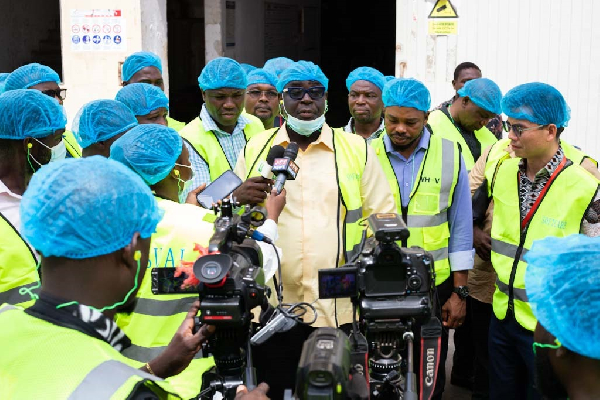 Hotordze Roosevelt Alexander speaking during an interview
Hotordze Roosevelt Alexander speaking during an interview
The Managing Director of a leading local manufacturing group has issued a strong warning about the alarming influx of substandard baby diapers into Ghana, calling for immediate government intervention to protect public health.
During a working visit by the Parliamentary Select Committee on Trade, Industry, and Tourism, the executive highlighted that many imported diapers lack basic quality standards, such as branding, manufacturing dates, and regulatory compliance. These products, often waste materials from their countries of origin, are being dumped into Ghana’s market for profit, posing serious risks to infant health.
“It is a grave concern for national health. We are seeing a situation where infants are being exposed daily to products that can cause skin irritation, infections, and long-term health problems. This must be treated as a national public health emergency,” the Managing Director emphasized.
Ghana records nearly 800,000 births annually, and children between the ages of 1 to 3 are heavy users of diapers. Based on current usage patterns, over 2.5 billion diaper changes occur each year, significantly amplifying the risk of widespread health impacts if action is not taken.
The executive further revealed that over 300 million diapers are imported annually into Ghana, leading to an estimated economic loss of US$2.2 million per year, largely due to regulatory loopholes and under- declaration at the ports.
Despite the influx, Ghana’s local manufacturing industry is fully capable of meeting national demand.
Eight domestic factories currently produce up to three billion diapers annually, three times the country’s needs. Similarly, local production of washing powder is sufficient to cover domestic consumption.

To address the crisis, the local manufacturing sector proposes urgent policy measures, including:
• Restrictiton on the imports of non-compliant diapers from their countries of origin.
• Enforcing stringent pre-shipment inspections and tighter port controls.
• Raising tariffs on finished imports such as diapers, sanitary pads, and washing powder from 20%
to 35%.
• Defining the importation of substandard goods as a threat to national health security.
Chairperson of the Parliamentary Select Committee, Hon. Hotordze Roosevelt Alexander, acknowledged the seriousness of the issue and pledged to escalate it to the Ghana Revenue Authority (GRA), Ghana Standard Authority (GSA), Food and Drugs Authority (FDA) and the Ministry of Trade. He stressed that protecting the health of Ghanaian children must be a national priority.
The Association of Ghana Industries (AGI) also expressed strong support, emphasizing that local industries possess the capacity to respond effectively if provided a level playing field.
